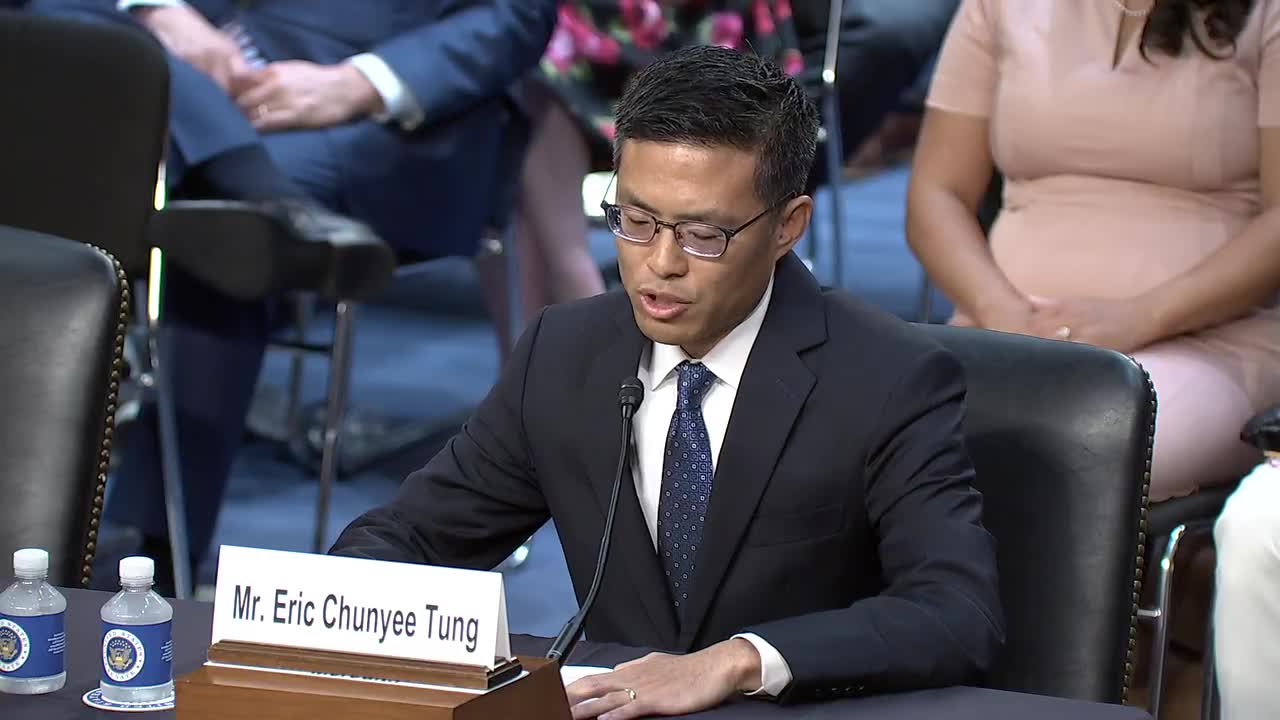Nominee Tung Highlights Judicial Lessons From Justices Scalia and Gorsuch
July 30, 2025 | Judiciary: Senate Committee, Standing Committees - House & Senate, Congressional Hearings Compilation
This article was created by AI summarizing key points discussed. AI makes mistakes, so for full details and context, please refer to the video of the full meeting. Please report any errors so we can fix them. Report an error »

During a recent nomination hearing held by the U.S. Senate Committee on the Judiciary, significant discussions unfolded regarding the qualifications and judicial philosophy of nominees for federal judgeships. The hearing, which took place on July 30, 2025, featured notable exchanges that highlighted the candidates' experiences and their visions for the judiciary.
One of the key moments came from nominee Eric Tung, who shared insights from his time clerking for Justices Antonin Scalia and Neil Gorsuch on the U.S. Supreme Court. Tung emphasized the importance of interpreting the Constitution and laws without personal bias, stating, “I learned firsthand about what it means to be a judge.” He expressed a commitment to uphold the rigorous standards of judicial conduct exemplified by the justices he served, particularly noting a lesson in diligence from Justice Scalia, who meticulously corrected a grammatical error in a Latin phrase Tung had included in a draft.
The hearing also featured discussions with nominee Andrew Dunlap, who has served as chairman of the advisory committee on Maine rules of appellate procedure since 2023. Dunlap underscored the necessity of making legal rules accessible to all individuals, particularly those representing themselves in court. He stated, “The law should be available to all and that the law should be impartially and fairly applied to every litigant who comes before the court.” This perspective reflects a growing emphasis on accessibility within the judicial system, which is crucial for fostering public trust and understanding.
Both nominees highlighted their extensive legal backgrounds, with Tung noting his experience in both public and private law practice, including handling appeals at various court levels. He articulated how these experiences have prepared him for the responsibilities of a federal appellate judge, emphasizing his familiarity with high-profile cases and appellate strategy.
As the committee continues to evaluate these nominees, the discussions from this hearing underscore the critical role that judicial appointments play in shaping the legal landscape. The outcomes of these nominations will not only influence the courts but also impact the broader community by ensuring that justice is administered fairly and effectively. The committee's next steps will be closely watched as they consider the implications of these appointments for the future of the judiciary.
One of the key moments came from nominee Eric Tung, who shared insights from his time clerking for Justices Antonin Scalia and Neil Gorsuch on the U.S. Supreme Court. Tung emphasized the importance of interpreting the Constitution and laws without personal bias, stating, “I learned firsthand about what it means to be a judge.” He expressed a commitment to uphold the rigorous standards of judicial conduct exemplified by the justices he served, particularly noting a lesson in diligence from Justice Scalia, who meticulously corrected a grammatical error in a Latin phrase Tung had included in a draft.
The hearing also featured discussions with nominee Andrew Dunlap, who has served as chairman of the advisory committee on Maine rules of appellate procedure since 2023. Dunlap underscored the necessity of making legal rules accessible to all individuals, particularly those representing themselves in court. He stated, “The law should be available to all and that the law should be impartially and fairly applied to every litigant who comes before the court.” This perspective reflects a growing emphasis on accessibility within the judicial system, which is crucial for fostering public trust and understanding.
Both nominees highlighted their extensive legal backgrounds, with Tung noting his experience in both public and private law practice, including handling appeals at various court levels. He articulated how these experiences have prepared him for the responsibilities of a federal appellate judge, emphasizing his familiarity with high-profile cases and appellate strategy.
As the committee continues to evaluate these nominees, the discussions from this hearing underscore the critical role that judicial appointments play in shaping the legal landscape. The outcomes of these nominations will not only influence the courts but also impact the broader community by ensuring that justice is administered fairly and effectively. The committee's next steps will be closely watched as they consider the implications of these appointments for the future of the judiciary.
View full meeting
This article is based on a recent meeting—watch the full video and explore the complete transcript for deeper insights into the discussion.
View full meeting